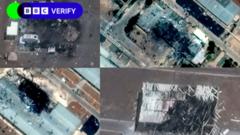Despite ongoing military conflicts, both Israel and Iran express willingness to engage in talks regarding nuclear development, amidst worries over Israel's recent strikes.
Diplomacy Unraveled: The Israeli-Iranian Nuclear Talks Stalled Amid Strikes

Diplomacy Unraveled: The Israeli-Iranian Nuclear Talks Stalled Amid Strikes
Tensions Rise as Israel's Preemptive Strikes May Undermine Diplomatic Efforts on Iran's Nuclear Program
June 15, 2025, 7:36 a.m. ET
As the conflict between Israel and Iran escalates, the prospects for nuclear talks have become murky. Israeli Prime Minister Benjamin Netanyahu maintains that military action was necessary to prevent a nuclear-armed Iran. However, Iranian Foreign Minister Abbas Araghchi declared on Sunday that Iran is still receptive to negotiations concerning its nuclear armament, emphasizing that any prospective agreements must not infringe on Iran's rights to enrich uranium for civilian usage.
Araghchi has voiced concerns, suggesting that Israel's military action aims to undermine diplomatic efforts and derail discussions regarding Iran's nuclear ambitions. He stated that the Israeli strategy is clear: to prevent any constructive agreements regarding nuclear capability. Analysts share this perspective, viewing Israel's attacks as an effort to quash negotiations and asserting that continued dialogue is crucial.
Netanyahu's apprehension stems from fears that any agreements granting Iran uranium enrichment rights would ultimately lead to future nuclear armament. Meanwhile, former President Trump remains hopeful that military pressure could lead Iran to the negotiation table from a weaker position. Yet, Iran stands firm on its entitlement to peaceful enrichment as guaranteed by the Nuclear Nonproliferation Treaty.
The sentiment among experts suggests that any rapid agreements yielding concessions on enrichment may be perceived as capitulation, further jeopardizing Iran’s stability and regime strength. Political analysts indicate that Iran is unlikely to surrender its enrichment capabilities easily, predicting a rocky path ahead for any renewed diplomatic endeavors between the two nations.
Steven Erlanger, Europe’s chief diplomatic correspondent, has covered international relations extensively, from the complexities of the Middle East to various global hotspots.
As the conflict between Israel and Iran escalates, the prospects for nuclear talks have become murky. Israeli Prime Minister Benjamin Netanyahu maintains that military action was necessary to prevent a nuclear-armed Iran. However, Iranian Foreign Minister Abbas Araghchi declared on Sunday that Iran is still receptive to negotiations concerning its nuclear armament, emphasizing that any prospective agreements must not infringe on Iran's rights to enrich uranium for civilian usage.
Araghchi has voiced concerns, suggesting that Israel's military action aims to undermine diplomatic efforts and derail discussions regarding Iran's nuclear ambitions. He stated that the Israeli strategy is clear: to prevent any constructive agreements regarding nuclear capability. Analysts share this perspective, viewing Israel's attacks as an effort to quash negotiations and asserting that continued dialogue is crucial.
Netanyahu's apprehension stems from fears that any agreements granting Iran uranium enrichment rights would ultimately lead to future nuclear armament. Meanwhile, former President Trump remains hopeful that military pressure could lead Iran to the negotiation table from a weaker position. Yet, Iran stands firm on its entitlement to peaceful enrichment as guaranteed by the Nuclear Nonproliferation Treaty.
The sentiment among experts suggests that any rapid agreements yielding concessions on enrichment may be perceived as capitulation, further jeopardizing Iran’s stability and regime strength. Political analysts indicate that Iran is unlikely to surrender its enrichment capabilities easily, predicting a rocky path ahead for any renewed diplomatic endeavors between the two nations.
Steven Erlanger, Europe’s chief diplomatic correspondent, has covered international relations extensively, from the complexities of the Middle East to various global hotspots.




















